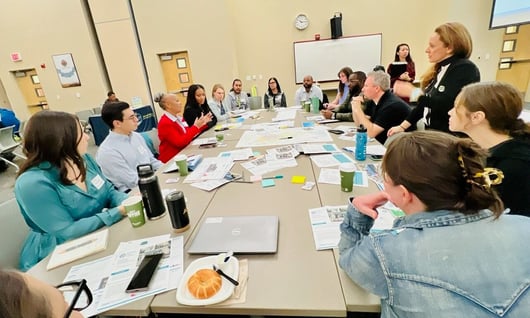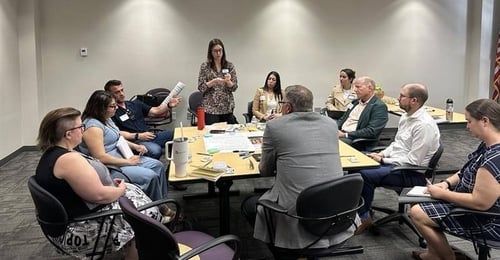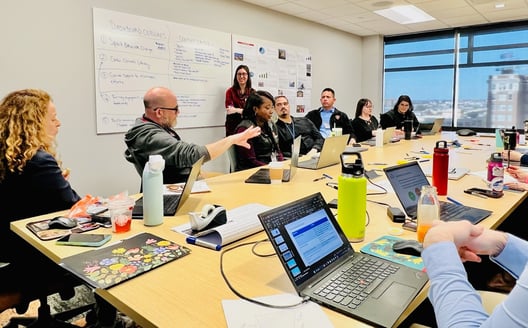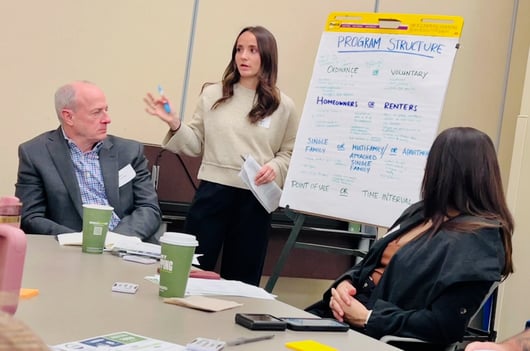Guest post by Carlyn Bacci, KLA's Community Engagement and Communications Specialist

“I just wanted to thank you for putting together a fun and interactive meeting. It was a very positive experience.”
Is that the feedback you usually get after running a meeting? That’s what we heard recently from our partners in Bellevue, Washington.
How about: “Kim is a master facilitator. For the stakeholder working group meetings, we crammed so much into two hours, but it was done so efficiently and so interactively. People really felt like they were heard and that their input and their feedback has been carried through in the plan.”
Those words came from our partners in Henderson, Nevada, this spring.

Over the course of KLA’s 10 years, we have facilitated countless meetings for or with our clients – everything from small internal strategy sessions to stakeholder working group sessions to full-blown community events. We’ve learned a ton along the way, and we proactively invest in facilitation as a cornerstone of our climate action planning services.
One thing is clear: strong meeting facilitation isn’t a default setting. And isn’t usually a skill that people have received training for in college or first jobs. That’s why we prioritize the development and honing of facilitation skills for the KLA team.
That includes tapping the expertise of Dallase Scott of Trust to help us level up. Dallase first did a training for our team back in 2022 followed by a stint on our SAS Talk with Kim podcast. Earlier this year, Dallase led a refresher training for our team along with one of our clients. As we’re still applying her insights and applying our own lessons every day, we wanted to share a few tips to help you score rave meeting reviews.
A lot more goes into meeting facilitation than it may seem. There are many factors that can make or break the productivity of a meeting, from group dynamics to strong personalities to lack of preparation. Fortunately, with the proper knowledge and preparation, facilitators can take the right steps to ensure their meeting is productive, positive, and efficient.

The Role of a Facilitator
The role of a facilitator is to efficiently guide the conversation without controlling it. A good facilitator must be willing to change their own behavior to make space for other personalities in the group. The facilitator will ultimately set the tone for the meeting, but they must do so without dictating the outcome—two tasks that can be quite challenging to balance. So how does one manage to run an efficient meeting without micromanaging the discussion?
Meeting Mechanics: Meeting Preparation
The first and perhaps most important place to start is with thorough meeting preparation. If you as a meeting facilitator fail to prepare, you are not just wasting one hour—you’re wasting one hour for EVERY person that attends the meeting. That can quickly add up to a lot of time!
Here are some checklist items you can do to ensure your meeting is time well spent:
-
Prep your agenda.
-
Send a pre-meeting email containing the agenda and any important information for the meeting.
-
Go over your notes beforehand and practice what you are going to say.
-
Create a list of meeting objectives and outcomes.

Human behavior
The next step to engaging and smooth facilitation is to understand the different dynamics that may affect the success of a meeting. Human behavior, unsurprisingly, plays a large role in meeting productivity. Every facilitator dreads the attendance of over sharers, under talkers, story tellers, misbelievers, and negative nellies. People have adopted these behaviors for a reason and approaching these behaviors with curiosity with a goal of understanding where folks are coming from can help us facilitate productive conversations no matter how challenging the group. The reality is that you likely model some of these challenging behaviors as well. So, get curious. With the right set of facilitation tools, you'll find that challenging behaviors are less pronounced simply by changing your tactic.
As humans, we tend to judge others by their actions and behavior. This can lead us to misinterpret another person’s intentions and misread situations. When facilitating, making quick judgements about participants based on their behavior can cause us to disregard certain members of the group. For example, consider a person that annoys the group by repeating themselves. Could he/she/they feel like no one is listening to them, which is causing them to try to make their point over and over? As a facilitator, ensuring each person feel heard and attempting to understand the intention behind participants’ actions can lead to a more productive and open discussion.

Psychology of self
Have you ever held your tongue in a meeting for fear of being wrong or feeling embarrassed? Many of us have been there. Humans are easily consumed by feelings of uncertainty or lack of trust—both of which lower our ability to perform in a team setting.
Facilitators must create a welcoming environment in which participants feel empowered to contribute to the conversation. Calling on individuals by name, writing down ideas on a large posterboard, and giving positive feedback are all ways to create an encouraging environment rather than an intimidating one.
Want more facilitation pro tips?
Read our more in-depth article on facilitation, listen to Kim's podcast with Dallase or tap her expertise more directly with on-demand professional development support through her Growing Trust series.

